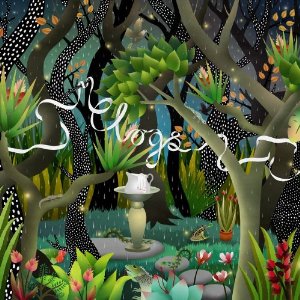
Bryce Dessner sure knows how to stay busy. Last year, he helped his twin brother stage the massive Dark Was the Night concert at Radio City Music Hall and put together his own multi-night multi-media work, The Long Count, at the Brooklyn Academy of Music. In addition he’s collaborated with Brooklyn neighbors like Sufjan Stevens and helped Bonnaroo co-founder Ashley Capps curate the second annual Big Ears Music Festival in Knoxville, TN. Throughout all this, the guitarist found time to record two full-length albums: one with his noted indie band The National ( High Violet ) and another his longtime avant-garde-classical project Clogs ( The Creatures In The Garden of Lady Walton ). Formed at Yale in the 1990s, the genre-jumping art band Clogs finds the guitarist exploring sonic territory with the likes of Padma Newsome (viola, violin), Rachael Elliott (bassoon, melodica) and Thomas Kozumplik (percussion). In the past decade the musicians have referenced everything from medieval folk to improvisational jazz, and The Creatures In The Garden of Lady Walton. During a rare moment of downtime between photo shoots, Dessner discusses Clogs’ evolution, his love of improvisation and why you might see him playing in a Grateful Dead cover band sometime soon.
Though many Relix and Jambands.com readers first heard of you through the National, Clogs has actually been around for over a decade. I believe the group first came together when you were a student at Yale—before the National officially formed, correct?
We were all there in music school for various reasons and so we kind of came together the summer after when we all finished in ‘99. At first it was really just an open ended question: we wanted to do some new type of group or band, and we all shared a similar classical background. We all also had an interest in composing and doing something more improvised, so that was the beginning. It took a while to figure out what that would be. Clogs’ sound has evolved in different ways over the years. Our first record [ 2001’s Thom’s Night Out ] was really full of simple melodies and folk chords, and the second one [ 2003’s Lullaby for Sue ] was much more experimental in tone, composition wise. And our third record [ 2004’s Stick Music ] had a lot of extended techniques and improvisation. The more recent record Lantern combined a lot of those ideas. I would say [2010’s] The Creatures In The Garden of Lady Walton has the richest sound because it’s really referencing a lot of different aspects of the music we’ve made together over the years.
Clogs has covered a lot of sonic territory over the years. What would you say has been the largest catalyst for this change in sound?
I think it’s just purely where are interests are. During the period we made Lantern both Padma and I were really interested in medieval music and renaissance music. There are a fair amount of contemporary composers who have that interest because it was before the rule book was written so there were all sorts of weird interesting themes happening. All that harmonically and rhythmically-based music has a really rich base that you can reference in a free way.
Part of our dynamic is that with four musicians, and we’ve always had the same four instruments. To keep it interesting for ourselves we had vary what we do with them. We always flirted early on—I spent a lot of time playing in a rock band [The National] and was we came more popular and had fans coming we were limited as to what we could do. I think early on with Clogs we had the idea that we could play this classically-based music in rock clubs, which we do still, but I think we also quickly figured out it would be more rewarding for us to keep things completely open terms of the sounds we make. On some level its kind of a laboratory for sound and composition and pretty free interesting environment to work in, you know? There’s no pressure from the label and there’s very little expectation. If anything I think the only expectation is that people like being surprised.
Given that the band is really defined by its four personalities, do you feel that Clogs’ evolution is really dictated and defined by its albums?
Yeah, I think so. In 2004 we made that record Stick Music, and I’m really proud of it. I think it’s possibly one of the best we’ve done. It was really esoteric live—we did a cult tour and people were really scratching their heads. It’s just very slow burn, very experimental, and I think that gave way to our Lantern period, which is sort of our punchiest and most accessible kind of record. I think that was partly because we were playing shows, and we needed to develop music people could get into and that happened that way. It’s probably a conscious choice on whoever’s composing the music. This record was conceived by Padma. It really hangs together like through his ideas—both in the lyrics and musically. It is kind of its own universe, and Clogs is nice because it can kind of adapt to that and molded into whatever way you choose.


No Comments comments associated with this post